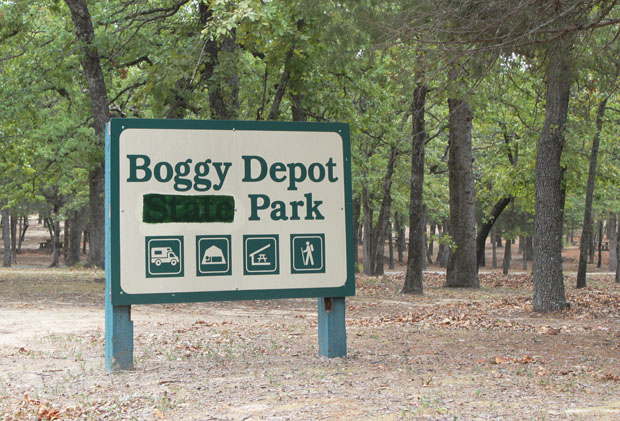
Boggy Depot was among seven sites stripped of their state park status in 2011.
Joe Wertz / StateImpact Oklahoma


Boggy Depot was among seven sites stripped of their state park status in 2011.
Joe Wertz / StateImpact Oklahoma

Joe Wertz / NPR StateImpact
Boggy Depot was among seven sites stripped of their state park status in 2011.
Despite its historical significance, Boggy Depot State Park was on the list of seven state parks scheduled to close as agency budgets were slashed for Fiscal Year 2012. But the Chickasaw and Choctaw Nations couldn’t let that happen.
Boggy Depot: ex-state park. It’s not easy to find along potholed country roads in rural Atoka County. The park is wholly uninteresting on the surface — camping areas, picnic tables, a cemetery, a few centuries-old foundation stones.
So why was Tourism and Recreation Department Director Deby Snodgrass concerned with Boggy Depot’s fate above all others?
“I struggled with this particular park transfer a lot,” Snodgrass said. “It was the one I worried the most about finding somebody to operate it.”
As it turns out, Boggy Depot is one of the most important historical sites in Oklahoma.
The Chickasaw and Choctaw tribes shared the future capital of the Choctaw Nation after being forced from the eastern United States in the 1830s. It was an important stop on the Overland Butterfield Stage Coach route that brought mail from St. Louis to San Francisco.
Red River-area historian Robin Cole-Jett describes Civil War skirmishes between Union raiding parties and Confederates camped at Boggy Depot.

Muriel Wright Collection / Oklahoma Historical Society
This image, taken in 1930, shows the old military trail that formed the post road and main street in Boggy Depot.
“You know how you always hear about the Civil War being brother on brother and cousin on cousin and kin on kin? In Indian Territory it really was,” Cole-Jett said. “Because you had maybe a Chickasaw person who was in favor of the Confederacy, and then his brother may have been against the Confederacy. So you literally had blood on blood fighting here. It was right over here in this field. It was a small camp, and [Union soldiers] would lay maybe beyond a hill and then suddenly whoop and holler and come in and just kind of ambush.”
From 1859 until his death in 1885, Boggy Depot was the home of Choctaw Chief Allen Wright, who is revered for translating the Chickasaw constitution, writing a Choctaw dictionary, and coining the word ‘Oklahoma.’ The famous chief’s great-great grandson is also named Allen Wright.
“He was one of the principal negotiators of the Choctaw/Chickasaw treaty of 1866, which was negotiated in Fort Smith, Ark.,” Wright said. “And it was during those discussions that he suggested ‘Oklahoma’ as the name for the new territory. ‘Oklahoma’ being two Choctaw words that mean ‘red people’.”
Chief Wright is buried in the family’s plot at the Boggy Depot cemetery, where headstone dates range from the 19th through the 21st centuries. The modern day Allen Wright plans to be buried there himself, and says the family was rocked by the state’s decision to close Boggy Depot.

Joe Wertz / NPR StateImpact
Choctaw Chief Allen Wright and his family are buried in the historic cemetery near Boggy Depot, which is now managed by the Choctaw Nation.
“The initial news was devastating,” Wright said. “That’s been a part of our family for hundreds of years, so for that to become abandoned was real concerning. We, as a family, didn’t know what we would do.”
But Wright’s concern turned to elation when he learned the state was transferring the park to the Choctaw Nation, which now runs the cemetery, and the Chickasaw Nation, which now operates the rest of the park. Chickasaw Governor Bill Anoatubby says while the country faces very difficult economic conditions, the Chickasaw Nation is booming, and he wants to reclaim Boggy Depot’s place in the tribe’s history.
“In fact we’re already making plans for some improvements, but eventually we’re going to make it more of an attraction,” Anoatubby said. “Our hope is to maybe do some restorations or recreations of the historical buildings and activities. We do have a lot of different camps for our youth, and we generally would lease an existing camp somewhere for that purpose. So we would look at that as a possibility — of creating some camp atmosphere.”
Boggy Depot is already under the management of the Chickasaws and Choctaws, but Oklahoma lawmakers will have to approve the transfer of the land next session for the tribes to officially own the park.